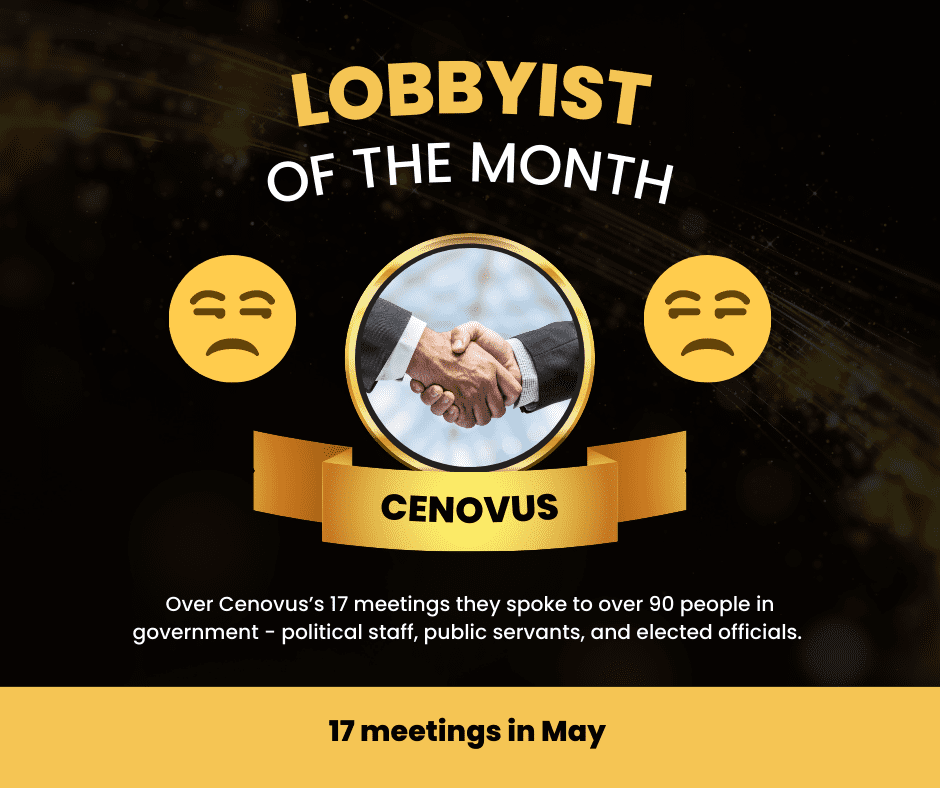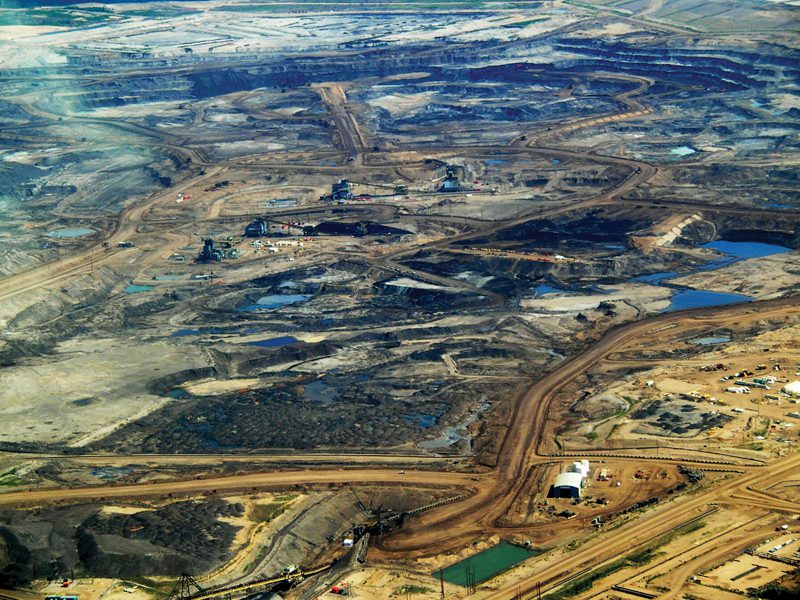Climate change needs government scale intervention. That’s clear and it’s why we work to hold the government accountable. We have the technology and know-how to embrace the solutions at our fingertips and start urgently scaling-up their implementation, so what’s holding the government back? Is it simply a lack of political will?
(👀 *side eye fossil fuel industry)
You don’t have to look any further than the oil and gas lobbyists in government offices every day of the month crying wolf about how unfair and destabilizing climate policy would be to their profits.
If you’ve been following our Lobby Bot blogs you’ll be familiar with these monthly round ups. They highlight which federal departments and cabinet Ministers frequently met with oil and gas lobbyists and expose the companies that have lobbied the most each month. We do this to shine a spotlight on the constant presence the oil and gas industry has on parliament hill, the relentless pressure the industry puts on the government and the scale of resources the industry is leveraging to fight against climate action.
Each month, we look at all the publicly available data on oil and gas companies from the federal government lobby registry, analyze it, and share the juicy details with you.
Like the fact that the fossil fuel industry lobbied more in May than any previous month this year, having 146 meetings with the government. That averages out to over six meetings per day in the office. Every day, multiple times a day, the oil and gas industry is telling someone in government to prioritize the fossil fuel industry’s interests, at the cost of a livable planet for us all.
Going forward we’ll also include more stories that help provide context for these lobby meetings: What was the industry asking for? What were they able to achieve?
So let’s dig into the numbers:
WHO LOBBIED THE MOST
The companies that held the most lobbying meetings with the federal government in May 2023 were:
- Cenovus had 17 meetings with government representatives. Cenovus is one of the largest tar sands companies in Canada. We recently announced that its Executive Chairman, Alex Pourbaix, is one of Canada’s Top 7 Climate Villains. He’s also one of the lead spokespeople for the Pathways Alliance, a coalition of the biggest tar sands companies behind a slick greenwashing campaign.It’s not just the number of meetings that made Cenovus the most forceful lobbyist in May, it’s also how many people they met with. Ninety government officials attended those 17 meetings – including political staff, public servants and elected representatives.


- This month it’s a four-way-tie between the Canadian Association of Petroleum Producers (CAPP), Imperial Oil, Suncor, and TC Energy. Each company had 15 lobby meetings with government representatives in May.CAPP is unsurprisingly one of the most consistent and active lobby groups -its purpose is to advocate for continued growth and profitability of the oil and gas industry. They were the top lobbyist in April, and our last blog scrutinizes some of the times they’ve lobbied to delay climate action and demand government handouts.Imperial Oil, and its CEO Brad Corson, were recently profiled as one of Canada’s Top 7 Climate Villains for the company’s atrocious record of tailings leaks, oil spills, failure to take climate action, greenwashing and Corson’s record profits.
WHICH MINISTRIES WERE LOBBIED THE MOST
The Ministries that took the most meetings with oil & gas companies and associations were:
- Environment and Climate Change Canada (ECCC) took 51 meetings.That’s the most meetings in a one month period that any Ministry has had so far this year, and there were over 100 ECCC government staff involved in those meetings.
- Natural Resources Canada (NRCan) had 38 meetings
- Innovation, Science and Economic Development Canada (ISED) had 18 meetings
Why so many meetings in May?
ECCC has been working on regulations to clean up Canada’s electricity grid with renewable power and is developing new rules to cap and cut emissions from the oil and gas sector. And at the end of July the government delivered on a longstanding commitment to end fossil fuel subsidies. ECCC is leading on these policies, but NRCan and ISED, and Finance Canada are all also involved, as well as Finance Canada – which had 16 lobby meetings with oil and gas in May.
The oil and gas sector is Canada’s largest source of greenhouse gas emissions, and has received tens of billions of dollars in handouts of public money from the federal government over the years. So, it’s not surprising that they’ve been trying to delay and create loopholes in these important pieces of federal climate policy. We can fight back against the oil and gas industry’s influence by demanding strong climate action from the government, including these important policies.
WHICH MINISTER WAS LOBBIED THE MOST
These federal ministers took the most meetings with oil & gas companies and associations:
- Jonathan Wilkinson, Minister of Natural Resources, took four meetings and three of them were with CAPP
- Three way tie between: Stephen Guilbeault, Minister of Environment and Climate Change; Chrystia Freeland, Deputy Prime Minister and Minister of Finance; and Mac Miller of Crown-Indigenous Relations, who all took two meetings
- Seamus O’Regan, Minister of Labour and Ahmed Hussen, Minister of Housing, Diversity and Inclusion, each took one meeting.
Ministers Wilkinson, Guilbeault, and Freeland all have sway when it comes to important climate policy like the greenhouse gas emissions cap. Based on the timeline of these meetings, we think it’s likely that CAPP and others were lobbying to try and weaken and put loopholes into that policy.
Tell the government to limit the ability of the oil and gas industry’s lobbyists to derail climate action and that you support essential climate policy like a hard cap on greenhouse gas emissions.
The oil and gas industry held 146 lobby meetings in May, a new Lobby Bot record. They’re clearly ramping up the pressure as the government gets closer to making big decisions on climate policy.
But we can be even louder. The public overwhelming supports government doing more to address climate change. So let’s make sure government can hear us speak up for climate action, and let’s not be afraid to embrace this energy transition.
WHY THESE NUMBERS MATTER
Politicians and Ministry staff don’t have to take these meetings, but they choose to hear out fossil fuel lobbyists.
And these numbers are most likely an underestimate. While we are tracking over 50 companies and lobby associations, there are even more companies which may engage in lobbying.
In addition, not all meetings and communications that we might consider to be “lobbying” are required to be disclosed, because of huge loopholes in the federal lobbying law. Lobbyists are only required to register and disclose their lobbying if they are paid on a contract to lobby or are lobbying more than 20 percent of their work time for a business or organization. As well, lobbying about the enforcement of a law or regulation, or about tax credits, which many oil and gas companies lobby for, is not required to be disclosed. Lastly, when lobbyists are invited to speak to decision-makers, those meetings don’t need to be disclosed. We know that departments have set up standing meetings with many of the fossil fuel lobbyists – those don’t show up in the registry.
Environmental non-governmental organizations (ENGOs), such as Environmental Defence, lobby, but do so in the public interest, not in the private interest, as oil and gas companies do. ENGOs are granted far less access to key government decision-makers.
We need to tell politicians to stand firm on the need for strong climate action – and stop caving in to big oil. Take action today and tell the federal government to put the interest of the people in Canada ahead of the narrow self-interest of oil and gas companies.
Until next month’s update, follow the lobby bot on Twitter here.








